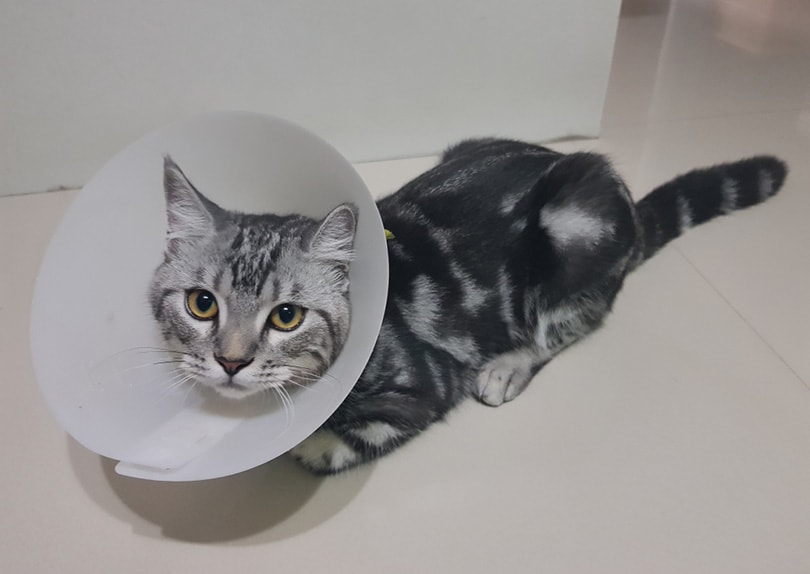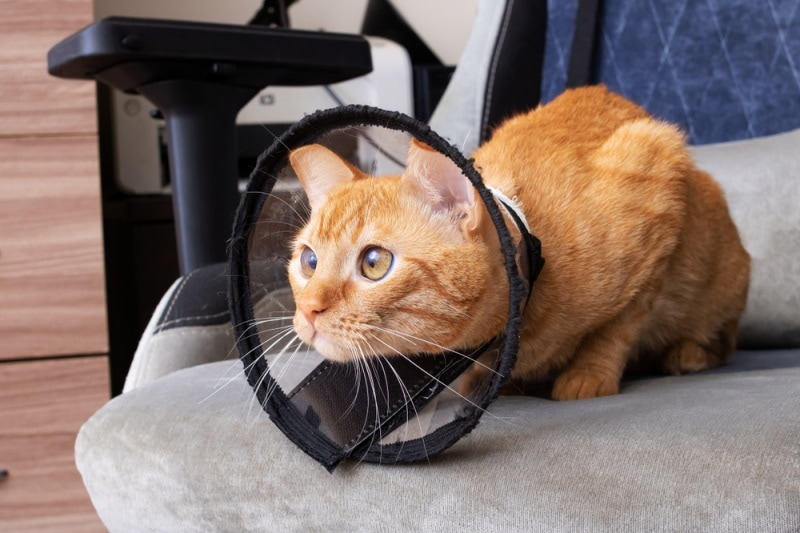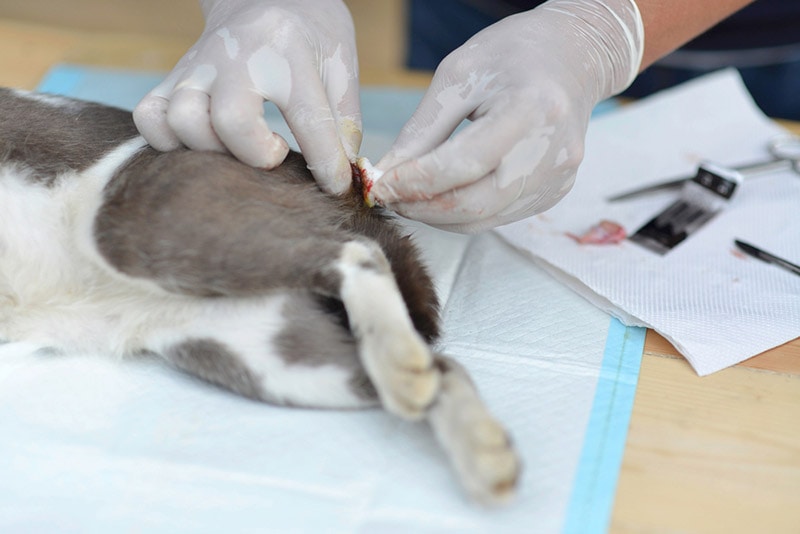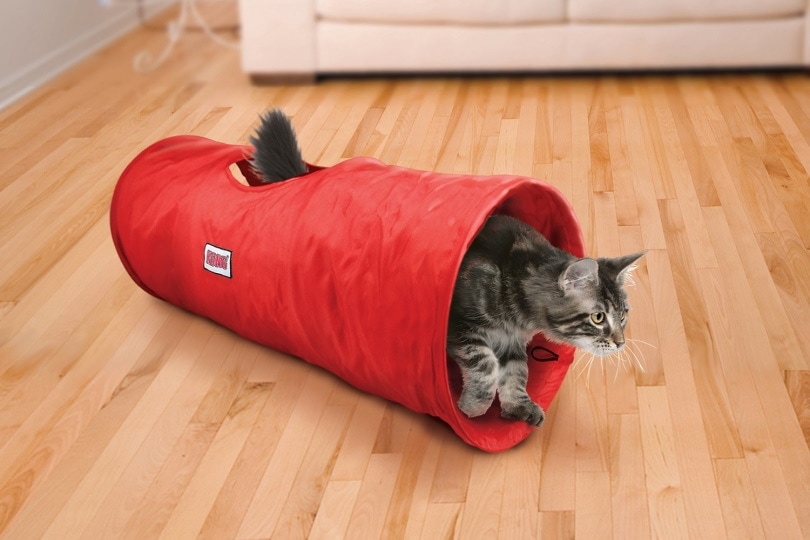Will Neutering a Cat Calm Him Down? Vet Reviewed Pros & Cons
By Ashley Bates
Updated on

If you have a male cat, getting them fixed in a timely fashion is super important. Males can exhibit some territorial aggression and marking behavior. Plus, they might even be more prone to running away. So, the benefits definitely outweigh the negatives.
Neutering can most certainly curb certain behaviors in cats. But in the list of benefits of neutering a male cat, will it also calm them down? Yes, neutering cats can definitely calm them down. Let’s talk about it!
Why Neutering Calms Cats Down
When your cat starts to get the flood of hormones responsible for reproduction that come with maturity, it will trigger all sorts of instinctual responses. It might cause an increase in activity, neuroticism, anxiousness, and aggression. With certain cats, these urges can be stronger.
Once your cat is altered, these tendencies take a back seat due to the reduction in these hormones. That is not to say that every cat will calm down energy levels after being spayed or neutered. It simply means that it will take care of a lot of hormonal-triggered behavioral issues.

When Do Males Reach Sexual Maturity?
Male cats reach sexual maturity at roughly 6 months of age. At this time, they will start to pump the reproductive hormones through their bodies, which can include major behavioral changes.
Veterinarians typically recommend you get your cat neutered between the ages of 8 weeks and 6 months. You must ask your veterinarian what they suggest based on your cat’s current state of health and other factors.
What Happens During a Neuter Surgery?
The process of neutering is called orchidectomy. When you get your cat neutered, they are put under general anesthesia so they remain completely still for the surgery. The vet will incision each side of the scrotal sac to remove both testicles.
This process is castration and will make your male unable to have kittens. So, if you wanted to breed your male with the female, neutering might not be on your list of solutions.
The procedure is much less invasive than spaying a female. So, your male will have less recovery time and be back on their feet before you know it.

Other Benefits of Neutering
The benefits of neutering certainly outweigh the negatives. When your cat reaches sexual maturity, it can cause many issues to develop. Most commonly, these are easily manageable and disappear quickly once your cat is fixed.
But the longer you wait, the more challenging these changes can sometimes be. So here are some positive things that may happen once the surgery is over.
Curbs Marking Behavior
Even though all male and female cats can spray both before and after getting fixed, neutering reduces the likelihood. When a male cat is fixed, the source of testosterone is removed, decreasing his desire to mark to ward off other male cats and attract females.
Relaxes Aggressive Tendencies
Because getting your cats fixed reduces the amount of hormones they produce, it makes them more docile in nature. Many folks turn to spaying and neutering because it reduces some of the aggressive and neurotic behaviors some felines develop.

Prevents Competition Fighting
If your cat is neutered, it will decrease its desire to fight with other intact males. So, if you’re letting your cat outside, you don’t have to worry about them getting into street brawls.
Tames Attitudes
If your cat is experiencing aggression and behavioral changes related to hormone influxes, neutering can definitely curb that. You might notice a big change shortly after surgery, or it might take many weeks to fully effect.
But on some level, regardless of the cat’s energy, you should be able to notice a difference.
Reduces The Risk of Certain Cancers
Neutering also helps reduce or eliminate the risk of reproductive cancers that are common in male cats.
These cancers become more likely to develop as your cat ages, so neutering them as soon as possible can greatly lower the chance of any cancer developing at any age of your cat’s lifespan.
Complications of Neutering
Some cats need more advanced surgery. At times, a testicle doesn’t descend, making it more complicated to remove.
Some cats can react badly to anesthesia, which can cause serious complications and even death. While this is very rare, it is a serious matter and often not detected until surgery is happening.
Additionally, neutering can cause weight gain. So once your cat is neutered, you’ll have to ensure they exercise appropriately and have the correct amount to eat; don’t overfeed them.

Correcting Marking Behavior
Marking behavior can be a tough bad habit to break, so early neutering is so important. If you find your cat spraying after neutering, you can try several things to lessen the effects.
Make Sure All Indoor Cats Are Fixed
If another indoor cat is not fixed, it can still trigger marking behavior in the ones who are. Always make sure that all cats are fixed. If one is still intact or competing with the others, destructive behaviors just might multiply.
Neutralize Target Areas
If your cat has started spraying, the behavior might continue after being neutered if they can smell it. Your cat’s sense of smell trumps yours, so even if you’ve cleaned up an area and think everything is okay, it might very well be detectable to your cat.
You can buy commercial neutralizers or make your own at home. A simple concoction of baking soda and vinegar can go a long way. So always make sure to use the product that’s best for your house and do your research.
Conclusion
So now you know that neutering your male cat will most certainly calm him down in certain ways. However, if your cat is still very young, they have lots of energy to burn. Kittens are generally mature around six months of age, and they can stay quite exuberant for years.
Different cats have varying energy levels, So this is no one-size-fits-all matter. Regardless of how much it calms your cat down, the benefits of neutering greatly outweigh the negatives, so you should talk to your vet about scheduling an appointment.
Featured Image Credit: Koiee, Shutterstock













